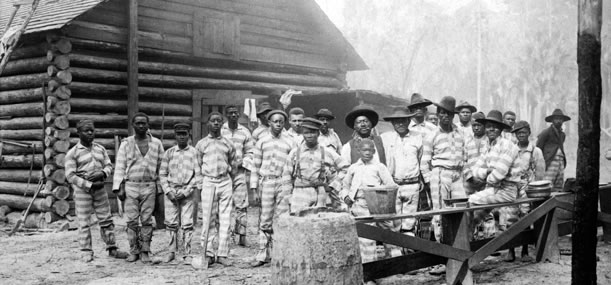The following
review was written by Dyana Daniels, a Chicago high school student, as part of
Columbia College Chicago’s Columbia Links journalism program for high school
students. RogerEbert.com has partnered with the Chicago Urban League and
Columbia Links to mentor these students and to give them a platform for their
writing. Read more about the program here.
3 stars
It has become
common for politicians to admit that America’s justice system is flawed and
needs to be changed. Few people
understand the actual cost the prison system has on the people it incarcerates.
The actors and the descendants of “Slavery by Another Name” skillfully show how
terrifying losing one’s freedom is.
“Slavery by
Another Name”debuted in 2012 and runs for 90 minutes. Samuel D.
Pollard, the director of this historical documentary, may also be known for his
work on “Eyes on the Prize” and “4 Little Girls.” Pollard has joined forces yet
again with Sheila Curran Bernard, a writer that worked on “Eyes on the Prize,” to adapt the book written by Douglas A. Blackmon.
Though slavery as
most Americans knew it ended with the passing of the Emancipation Proclamation,
the ghost of this dark time still lives on. Historians and scholars argue that
slavery is still alive thanks to the criminal system. According to the
NAACP nationwide, African Americans represent 26 percent of juvenile arrests,
44 percent of youth detained, 46 percent of the youth who are judicially waived
to criminal court, and 58 percent of the youth admitted to state prisons
(Center on Juvenile and Criminal Justice). “Slavery by Another Name” explains
the history of African Americans after they were freed from slavery and the
many obstacles they faced trying to maintain their new freedom.
The documentary “Slavery
by Another Name” is enjoyable, but has its flaws. The film spans over eight
decades starting from 1865. It does well when incorporating interviews with the
descendants of the oppressed and convicted, but falls short when it comes to fully
telling these people’s stories.
Pollard’s film also falls
short when it comes to transitioning between the decades of hardships African
Americans dealt with in the South at the hands of former slave owners and the
tactics used by those in the North. As a result, the audience is left wondering
what Northern states were doing to oppress then-free African Americans. The
testimony from wealthy business men’s grandchildren during reenactment scenes
seems limited and at times unbelievable. The testimony of the grandchildren of
convicts and former slaves made their ancestors’ stories more believable. While
the actors who played John Davis (Turron Kofi Alleyne) and Warren Reese (Tyler
Hollinger) were convincing, a few actors seemed to lack the ability to display
emotions. With the help of Laurence Fishburne as the narrator, the stories of
the forgotten came to life.
This film speaks
to the ignorance of some Americans when looking back at the history of this
country. Early in the documentary, the great granddaughter of B.B. Comer mentions how
she only heard of how successful her relative was, but she is devastated when
she later learns the truth.
The testimonies
of the granddaughters of former slave owners and “self-made” millionnaires due to the prison system during the 19th
Century help and hinder the documentary. The need to reinforce the tragedies
that occurred due to greedy business men who devalued their fellow human beings
for profit is prominent in these women’s speeches. On the other hand, the
relative of B.B. Comer seems emotionless which makes her remorse unbelievable.
In the end, the
cast of “Slavery by Another Name” helps to breathe life into non-famous persons
in history to show why the problems talked about today have not entirely
changed. The history beyond the movie further illuminates not just how far an
oppressed people have come, but still how much further they have to go to
obtain all that was promised to them.











